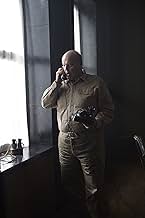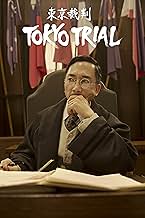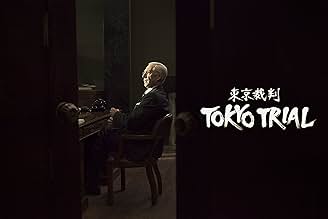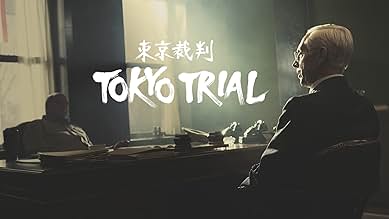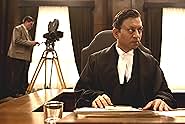Tokyo Trial
- Miniserie de TV
- 2016
- 50min
PUNTUACIÓN EN IMDb
7,3/10
2,1 mil
TU PUNTUACIÓN
Paralelo a los Juicios de Nuremberg, once jueces de las potencias aliadas juzgarán a los criminales de guerra japoneses en medio de tensiones internacionales.Paralelo a los Juicios de Nuremberg, once jueces de las potencias aliadas juzgarán a los criminales de guerra japoneses en medio de tensiones internacionales.Paralelo a los Juicios de Nuremberg, once jueces de las potencias aliadas juzgarán a los criminales de guerra japoneses en medio de tensiones internacionales.
- Premios
- 1 premio y 1 nominación en total
Explorar episodios
Reseñas destacadas
Not for the impatient, this 4 part series is designed for viewers who are willing to listen to everything that is said.
Ideas about atrocities, crimes against humanity, and what is acceptable in war-making are presented throughout. Always in the background: the Nuremberg Trials and how posterity will view the trial and the judges.
Production values are top-notch but never over the top. There's a very clever interpolation of actual courtroom newsreel footage with scenes from this show -- very good set and color matching.
This is a show about ideas and about how the winners view morality and their roles in defining what is and is not acceptable in warfare.
Recommended.
Ideas about atrocities, crimes against humanity, and what is acceptable in war-making are presented throughout. Always in the background: the Nuremberg Trials and how posterity will view the trial and the judges.
Production values are top-notch but never over the top. There's a very clever interpolation of actual courtroom newsreel footage with scenes from this show -- very good set and color matching.
This is a show about ideas and about how the winners view morality and their roles in defining what is and is not acceptable in warfare.
Recommended.
10rps-2
With so much mindless fluff on television, how great it is to see a serious and superbly done docudrama. Tokyo Trial covers the legal and political battles that were bitterly fought behind closed doors for two years after the Japanese surrender. The tribunal wrestled with the issue of whether Japanese leaders could be punished for aggression when there really was no law against aggression and whether the Japanese incursion into China was really any different from the British in India or the Americans' genocide of their native population. We are privy to some superb behind the scenes legal discussions. The series exudes honesty and accuracy. It uses one very effective technique. The scenes in the courtroom are shown in newsreel style black and white while the dialogue is heard in the tinny, halting voice of the translator. Most effective! The various judges are brilliantly drawn. Each is a unique personality. The clothing, the accents, even the body language, are all carefully presented and give the series a genuine " slice of the past" quality that few films achieve. I sometimes despair that we use our amazing video technology for trivialities and trash. This series shows what television can accomplish but so seldom does.
I was in the United States Army, 1st Cav Division 8th Cav Regt. stationed in Tokyo when this trial was going on. I spent a lot of time with one of the defense attorneys. I attended the trial when I could. One of my interests while I was in Japan (for one and a half years) was to learn as much as i could about the war and the Japanese people. This series was very interesting to me, as it was seen through others eves, not just mine. The scenes of the city were not what I saw, and the General Mac Arthur character did not match up with the real General, who i saw many times. The Imperial Hotel sets brought me back to my first week in Tokyo, as one of my first stops in Tokyo was to visit Frank Lloyd Wright's Masterpiece, The Imperial Hotel.
To tell a story as complex as this one was, would take as many years as the trial took and in the end, I am sure we would not know or understand what actually happened and who was at fault. We do know that the Japanese lost the war but in the long run Japan was given a new start and the people of Japan were smart enough to make the most of it.
I've spent half a century as a professional historian and thirty as an international criminal lawyer studying, recording and engaged in commentaries on the history and jurisprudence of the International Military Tribunal for the Far East. I've also closely studied the records of many, many hundreds of national war crimes trials that followed the Far East and Pacific Conflict, plus other national and international war crimes trials elsewhere from the late nineteenth century to more recent times. The 2 1/2 year Tokyo Trial (IMTFE) was much longer, more complex and covered a more extended period of events than its nine-month international counterpart at Nuremberg. Both of these two trials, however, were 'Class A' war crimes trials, meaning that their central focus was on an alleged conspiracy to plan, prepare, initiate and wage wars of aggression ("Crimes against Peace"). There was plenty on 'Class B/C" offences (violations of the laws and usages of war ("War Crimes" in the usual sense of atrocities against the laws and usages of war) and upon 'Crimes against Humanity' against civilians, but the bulk of those offences were tried in the so-called Minor War Crimes Trials that were held by individual countries and generally in the countries where those crimes had taken place. Only Nuremberg also dealt with Genocide.
This film concentrates on what was considered even at the time as the most important issue, what was called 'the master crime', Crimes against Peace, not only because that was the one thing that set Class A cases apart from others but because there was a deeply flawed general theory that without an aggressive war the other kinds of offences couldn't take place on an organised or systematic basis. But in a more particular sense the importance of this film is that it focusses on the very legality of having a trial concerning 'Crimes against Peace' which behind the scene was questioned by the judges at the Tokyo Trial in ways that didn't gain any traction at all at Nuremberg. The Judges at Nuremberg agreed never to discuss how their deliberations proceeded and how the trial almost collapsed due to the divisions between them. And this is the first time that their struggles over that issue have been aired in a major international film production. what is clear is that they understood that if the view held by the majority did not prevail, all that was achieved at Nuremberg in holding individuals criminally responsible for planning, preparing, initiating and waging wars of aggression would have fallen apart as a new rule of international law. If the couple of dozen defendants in the Tokyo Trial had to pay an heavy price in the process of turning a rule intended to bind states into a rule fit for holding individual leaders criminally responsible even to the point of losing their lives, then that ex post facto lawmaking was considered justifiable by the majority of members of the Tribunal. For others, that was a bridge too far.
Did the majority do the right thing? Judge for yourself. But did the upholding of the Nuremberg precedent really change the world as hoped? Sadly, no: the International Criminal Court has yet to claim its jurisdiction to try such cases. The architects of the most significant post-1945 aggressive wars have escaped justice, not least in the lands of those Members of the Tokyo Tribunal who were most keen to see that jurisdiction bedded down in national and international trials and in the conduct of states towards each other. As for the acting, the direction, the script and the fairness of this account: the film is awesome and as completely accurate as it is possible to be. This mini-series is a masterpiece.
This film concentrates on what was considered even at the time as the most important issue, what was called 'the master crime', Crimes against Peace, not only because that was the one thing that set Class A cases apart from others but because there was a deeply flawed general theory that without an aggressive war the other kinds of offences couldn't take place on an organised or systematic basis. But in a more particular sense the importance of this film is that it focusses on the very legality of having a trial concerning 'Crimes against Peace' which behind the scene was questioned by the judges at the Tokyo Trial in ways that didn't gain any traction at all at Nuremberg. The Judges at Nuremberg agreed never to discuss how their deliberations proceeded and how the trial almost collapsed due to the divisions between them. And this is the first time that their struggles over that issue have been aired in a major international film production. what is clear is that they understood that if the view held by the majority did not prevail, all that was achieved at Nuremberg in holding individuals criminally responsible for planning, preparing, initiating and waging wars of aggression would have fallen apart as a new rule of international law. If the couple of dozen defendants in the Tokyo Trial had to pay an heavy price in the process of turning a rule intended to bind states into a rule fit for holding individual leaders criminally responsible even to the point of losing their lives, then that ex post facto lawmaking was considered justifiable by the majority of members of the Tribunal. For others, that was a bridge too far.
Did the majority do the right thing? Judge for yourself. But did the upholding of the Nuremberg precedent really change the world as hoped? Sadly, no: the International Criminal Court has yet to claim its jurisdiction to try such cases. The architects of the most significant post-1945 aggressive wars have escaped justice, not least in the lands of those Members of the Tokyo Tribunal who were most keen to see that jurisdiction bedded down in national and international trials and in the conduct of states towards each other. As for the acting, the direction, the script and the fairness of this account: the film is awesome and as completely accurate as it is possible to be. This mini-series is a masterpiece.
This is a fascinating, well made four-part miniseries. I watched it on Netflix over four days, but it's so good, I can see how one might want to binge watch it. It reminded me of Twelve Angry Men.
In 1946, eleven Allied Judges were appointed to The International Military Tribunal for the Far East (IMTFE), aka Tokyo Trial or Tokyo War Crimes Tribunal. Their job was to try twenty-eight Japanese leaders for conventional war crimes and crimes against humanity. I didn't know anything about this trial.
The participating countries were: Australia, Canada, China, France, British India, the Netherlands, New Zealand, the Philippines, the Soviet Union, the United Kingdom, and the United States. Later a twelfth judge from India was added. These dedicated, but very different men, (yep, all men in those days), had legal and moral clashes with regards to how to stay true to the law, remain impartial, and prevent similar atrocities.
This tribunal would form the foundation of how "war as a crime by individuals" would be judged in the future. It had previously existed only part of the Paris Peace Pact of 1928. They ran into a problem with war crimes being ascribed only to a Nation and not to an individual.
There is infighting, cliques, power struggles, and schisms amongst the judges. Pal and Röling are outspoken in their dissent, which created an interesting narrative. Röling is the main protagonist; we get a glimpse into his creative relationship with German pianist Eta Harich-Schneider.
Many of the accused were found guilty, including former Prime Minister Hideki Tojo.
I listed the judges to keep track of them.
In 1946, eleven Allied Judges were appointed to The International Military Tribunal for the Far East (IMTFE), aka Tokyo Trial or Tokyo War Crimes Tribunal. Their job was to try twenty-eight Japanese leaders for conventional war crimes and crimes against humanity. I didn't know anything about this trial.
The participating countries were: Australia, Canada, China, France, British India, the Netherlands, New Zealand, the Philippines, the Soviet Union, the United Kingdom, and the United States. Later a twelfth judge from India was added. These dedicated, but very different men, (yep, all men in those days), had legal and moral clashes with regards to how to stay true to the law, remain impartial, and prevent similar atrocities.
This tribunal would form the foundation of how "war as a crime by individuals" would be judged in the future. It had previously existed only part of the Paris Peace Pact of 1928. They ran into a problem with war crimes being ascribed only to a Nation and not to an individual.
There is infighting, cliques, power struggles, and schisms amongst the judges. Pal and Röling are outspoken in their dissent, which created an interesting narrative. Röling is the main protagonist; we get a glimpse into his creative relationship with German pianist Eta Harich-Schneider.
Many of the accused were found guilty, including former Prime Minister Hideki Tojo.
I listed the judges to keep track of them.
- Tim Ahern as Major General Myron C. Cramer (United States)
- Paul Freeman as The Honourable Lord William D. Patrick (United Kingdom)
- Serge Hazanavicius as Henri Bernard (France)
- Marcel Hensema as Professor Bert V.A. Röling (Netherlands)
- Jonathan Hyde as President Sir William Webb (Australia)
- Irrfan Khan as Radhabinod Pal (India)
- Stephen McHattie as Edward Stuart McDougall (Canada)
- David Tse as Mei Ju-ao (China)
- Julian Wadham as Sir Erima H. Northcroft (New Zealand)
- Bert Matias as Colonel Delfín Jaranilla (Philippines)
- Kestutis Stasys Jakstas as Major General I.M. Zaryanov (Soviet Union)
- William Hope as John P. Higgins (United States)
¿Sabías que...?
- CuriosidadesAll the furniture in the courtroom, hotel and restaurant sets were custom-built replicas made by the art and construction departments for use on the production in order for everything to look authentic.
- PifiasMajor General Cramer, Judge Advocate General (JAG) of the United States Army, is wearing the Corps of Engineers branch insignia instead of the JAG branch insignia.
- ConexionesEdited into Tokyo Trial (2017)
Selecciones populares
Inicia sesión para calificar y añadir a tu lista para recibir recomendaciones personalizadas
- How many seasons does Tokyo Trial have?Con tecnología de Alexa
Detalles
- Fecha de lanzamiento
- Países de origen
- Sitio oficial
- Idiomas
- Títulos en diferentes países
- Токийский процесс
- Localizaciones del rodaje
- Didziasalis, Ignalina District Municipality, Lithuania(Post War Tokyo)
- Empresas productoras
- Ver más compañías en los créditos en IMDbPro
Contribuir a esta página
Sugerir un cambio o añadir el contenido que falta


